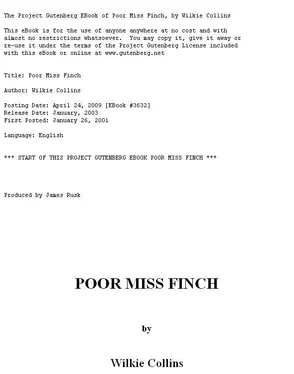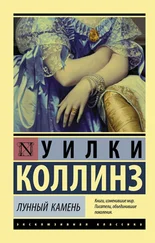Уилки Коллинз - Poor Miss Finch
Здесь есть возможность читать онлайн «Уилки Коллинз - Poor Miss Finch» весь текст электронной книги совершенно бесплатно (целиком полную версию без сокращений). В некоторых случаях можно слушать аудио, скачать через торрент в формате fb2 и присутствует краткое содержание. Год выпуска: 2002, Жанр: Классическая проза, на английском языке. Описание произведения, (предисловие) а так же отзывы посетителей доступны на портале библиотеки ЛибКат.
- Название:Poor Miss Finch
- Автор:
- Жанр:
- Год:2002
- ISBN:нет данных
- Рейтинг книги:3 / 5. Голосов: 1
-
Избранное:Добавить в избранное
- Отзывы:
-
Ваша оценка:
- 60
- 1
- 2
- 3
- 4
- 5
Poor Miss Finch: краткое содержание, описание и аннотация
Предлагаем к чтению аннотацию, описание, краткое содержание или предисловие (зависит от того, что написал сам автор книги «Poor Miss Finch»). Если вы не нашли необходимую информацию о книге — напишите в комментариях, мы постараемся отыскать её.
Poor Miss Finch — читать онлайн бесплатно полную книгу (весь текст) целиком
Ниже представлен текст книги, разбитый по страницам. Система сохранения места последней прочитанной страницы, позволяет с удобством читать онлайн бесплатно книгу «Poor Miss Finch», без необходимости каждый раз заново искать на чём Вы остановились. Поставьте закладку, и сможете в любой момент перейти на страницу, на которой закончили чтение.
Интервал:
Закладка:
To my relief, she showed no sign of feeling it as I did. "May I see you, in my way?" she asked gently—and held up her pretty white hand. "May I touch your face?"
I sat down at once on the window-seat. The soft rosy tips of her fingers seemed to cover my whole face in an instant. Three separate times she passed her hand rapidly over me; her own face absorbed all the while in breathless attention to what she was about. "Speak again!" she said suddenly, holding her hand over me in suspense. I said a few words. She stopped me by a kiss. "No more!" she exclaimed joyously. "Your voice says to my ears, what your face says to my fingers. I know I shall like you. Come in, and see the rooms we are going to live in together."
As I rose, she put her arm round my waist—then instantly drew it away again, and shook her fingers impatiently, as if something had hurt them.
"A pin?" I asked.
"No! no! What colored dress have you got on?"
"Purple."
"Ah! I knew it! Pray don't wear dark colors. I have my own blind horror of anything that is dark. Dear Madame Pratolungo, wear pretty bright colors, to please me! " She put her arm caressingly round me again—round my neck, however, this time, where her hand could rest on my linen collar. "You will change your dress before dinner—won't you?" she whispered. "Let me unpack for you, and choose which dress I like."
The brilliant decorations of the corridor were explained to me now!
We entered the rooms; her bed-room, my bed-room, and our sitting-room between the two. I was prepared to find them, what they proved to be—as bright as looking-glasses, and gilding, and gaily-colored ornaments, and cheerful knick-knacks of all sorts could make them. They were more like rooms in my lively native country than rooms in sober colorless England. The one thing which I own did still astonish me, was that all this sparkling beauty of adornment in Lucilla's habitation should have been provided for the express gratification of a young lady who could not see. Experience was yet to show me that the blind can live in their imaginations, and have their favorite fancies and illusions like the rest of us.
To satisfy Lucilla by changing my dark purple dress, it was necessary that I should first have my boxes. So far as I knew, Finch's boy had taken my luggage, along with the pony, to the stables. Before Lucilla could ring the bell to make inquiries, my elderly guide (who had silently left us while we were talking together in the corridor) re-appeared, followed by the boy and a groom, carrying my things. These servants also brought with them certain parcels for their young mistress, purchased in the town, together with a bottle, wrapped in fair white paper, which looked like a bottle of medicine—and which had a part of its own to play in our proceedings, later in the day.
"This is my old nurse," said Lucilla, presenting her attendant to me. "Zillah can do a little of everything—cooking included. She has had lessons at a London Club. You must like Zillah, Madame Pratolungo, for my sake. Are your boxes open?"
She went down on her knees before the boxes, as she asked the question. No girl with the full use of her eyes could have enjoyed more thoroughly than she did the trivial amusement of unpacking my clothes. This time, however, her wonderful delicacy of touch proved to be at fault. Of two dresses of mine which happened to be exactly the same in texture, though widely different in color, she picked out the dark dress as being the light one. I saw that I disappointed her sadly when I told her of her mistake. The next guess she made, however, restored the tips of her fingers to their place in her estimation: she discovered the stripes in a smart pair of stockings of mine, and brightened up directly. "Don't be long dressing," she said, on leaving me. "We shall have dinner in half an hour. French dishes, in honor of your arrival. I like a nice dinner—I am what you call in your country, gourmande. See the sad consequence!" She put one finger to her pretty chin. "I am getting fat! I am threatened with a double chin—at two and twenty. Shocking! shocking!"
So she left me. And such was the first impression produced on my mind by "Poor Miss Finch."
CHAPTER THE FOURTH
Twilight View of the Man
OUR nice dinner had long since come to an end. We had chattered, chattered, chattered—as usual with women—all about ourselves. The day had declined; the setting sun was pouring its last red luster into our pretty sitting-room—when Lucilla started as if she had suddenly remembered something, and rang the bell.
Zillah came in. "The bottle from the chemist's," said Lucilla. "I ought to have remembered it hours ago."
"Are you going to take it to Susan yourself, my dear?"
I was glad to hear the old nurse address her young lady in that familiar way. It was so thoroughly un-English. Down with the devilish system of separation between the classes in this country—that is what I say!
"Yes; I am going to take it to Susan myself."
"Shall I go with you?"
"No, no. Not the least occasion." She turned to me. "I suppose you are too tired to go out again, after your walk on the hills?" she said.
I had dined; I had rested; I was quite ready to go out again, and I said so.
Lucilla's face brightened. For some reason of her own, she had apparently attached a certain importance to persuading me to go out with her.
"It's only a visit to a poor rheumatic woman in the village," she said. "I have got an embrocation for her; and I can't very well send it. She is old and obstinate. If I take it to her, she will believe in the remedy. If anybody else takes it, she will throw it away. I had utterly forgotten her, in the interest of our nice long talk. Shall we get ready?"
I had hardly closed the door of my bedroom when there was a knock at it. Lucilla? No; the old nurse entering on tiptoe, with a face of mystery, and a finger confidentially placed on her lips.
"I beg your pardon, ma'am," she began in a whisper. "I think you ought to know that my young lady has a purpose in taking you out with her this evening. She is burning with curiosity—like all the rest of us for that matter. She took me out, and used my eyes to see with, yesterday evening; and they have not satisfied her. She is going to try your eyes, now."
"What is Miss Lucilla so curious about?" I inquired.
"It's natural enough, poor dear," pursued the old woman, following her own train of thought, without the slightest reference to my question. "We none of us can find out anything about him. He usually takes his walk at twilight. You are pretty sure to meet him to-night; and you will judge for yourself, ma'am—with an innocent young creature like Miss Lucilla—what it may be best to do?"
This extraordinary answer set my curiosity in a flame.
"My good creature!" I said, "you forget that I am a stranger! I know nothing about it. Has this mysterious man got a name? Who is 'He'?"
As I said that, there was another knock at the door. Zillah whispered, eagerly, "Don't tell upon me, ma'am! You will see for yourself. I only speak for my young lady's good." She hobbled away, and opened the door—and there was Lucilla, with her smart garden hat on, waiting for me.
We went out by our own door into the garden, and passing through a gate in the wall, entered the village.
After the caution which the nurse had given me, it was impossible to ask any questions, except at the risk of making mischief in our little household, on the first day of my joining it. I kept my eyes wide open, and waited for events. I also committed a blunder at starting—I offered Lucilla my hand to lead her. She burst out laughing.
"My dear Madame Pratolungo! I know my way better than you do. I roam all over the neighborhood, with nothing to help me but this."
Читать дальшеИнтервал:
Закладка:
Похожие книги на «Poor Miss Finch»
Представляем Вашему вниманию похожие книги на «Poor Miss Finch» списком для выбора. Мы отобрали схожую по названию и смыслу литературу в надежде предоставить читателям больше вариантов отыскать новые, интересные, ещё непрочитанные произведения.
Обсуждение, отзывы о книге «Poor Miss Finch» и просто собственные мнения читателей. Оставьте ваши комментарии, напишите, что Вы думаете о произведении, его смысле или главных героях. Укажите что конкретно понравилось, а что нет, и почему Вы так считаете.






